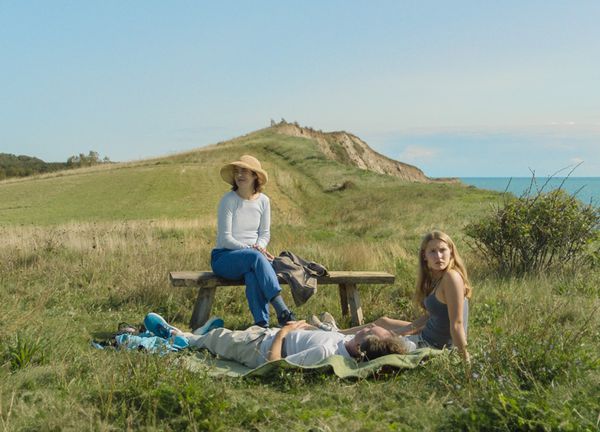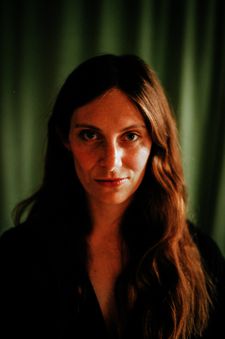 |
| My Eternal Summer. Sylvia Le Fanu on the writing process: 'The way we write, we work a lot from memories and that's where we start' Photo: Courtesy of San Sebastian Film Festival |
The terminally ill mum is very present in the movie for a person who is dying compared to the way that terminally ill characters can sometimes be treated more like an object than a dynamic human. How did you come to that decision and development?
Sylvia Le Fanu: It was a very important subject for me and it's been very difficult because, of course, when you're Ill, often you do just become the physical body because of the pain of it. But this is based on a personal story and I remember my own mother, in glimpses, being full of life and being brave and strong and I thought that's so important to have that nuance, just because that's the truth I know about the ups and downs. When you're waiting for a long time there are going to be better moments and worse moments, even physically. I think people may expect it sometimes just goes downhill from the point of diagnosis and that's not always the case.
It must have been difficult because not only are you articulating emotions that you've experienced personally on screen but now people like Me are asking you questions about it. Were you ever nervous about tackling this story for that reason?
 |
| Sylvia Le Fanu: t'There has been that element of therapy, in a way' |
I wondered whether being able to fictionalise it is quite cathartic in a way?
SLF: It was very helpful that I could distance myself enough in the process. I don't really like the word distance because I had to stay very close and open to the material, but there has been that element of therapy, in a way.
In terms of casting that must also be quite difficult when there is a real thing in your mind but you want to make sure that it's a fictional thing as well. So was that tricky and how did you go about it?
SLF:It’s as if you know exactly what I've been doing. That's what was the most difficult thing in a way to find, particularly, the mother. It took over a year, and with the daughter Fanny it took a couple of years just because we were looking from the very beginning. I just wanted it to be a long process of time. And then we found Kaya who plays Fanny. We met her when she was 13 the first time, so very young for this role and then it took three years, so she was 15 by the time we made it. In the case of the mother, I could have picked if I had just been more confident. I had her in the loop very early and I was just hesitant just for the reasons you can imagine. As soon as I picked her, she gave the role exactly what I needed, this otherness that I think I needed to move on.
I imagine it’s almost more of an emotional climb before you start than once you’re on the treadmill and others are collaborating with you.
SLF: I think that’s always the case up to that point. That’s 80 per cent of the work.
Did you have a place in mind where you wanted to go and shoot this?
SLF: I just knew for the basic set-up that they would want to go somewhere nice for her final time. My background is British, my childhood summers were spent in the south of England, Dorset countryside. So, finding some ways to adapt that into some Danish context, it just led us to this beautiful island south of Denmark called Langeland. So there was something that had to be a bit familiar for me in that.
The teenage character of Fanny is very interesting. You've not been scared to make her spiky, which is also quite unusual.
SLF: In a way it’s just what happened because the way we write, we work a lot from memories and that's where we start. We're not trying to figure out the whole outline but just picking these moments. A lot of these moments had that taste to them with her. She was struggling a lot and I didn't want to sugarcoat that. It was very important for me to show that the kind of cliched idea of sitting next to your mother holding her hand was very far from the truth I knew. And I thought that was very important to put that through. I had to trust in it because, of course, we were worried that we could lose sympathy but I had to trust that if we had the small cracks of vulnerability, we could trust the audience to forgive her. And I had to forgive her in a way.
Did you work with Kaya a lot in terms of the rehearsal process? Because quite a lot of this is to do with the headspace of her character. She's working through things that she can't articulate with her other family members as often happens around illness and families.
SLF: When I said about the long casting process, she was an amazing champion for three years, not being picked yet but was meeting her a couple of times a year. It just grew in a very organic way. And then, of course, when she was picked, we had, I think, six months of meeting weekly. It was a luxury in a way. I think that it was very important that we had that closeness to work together with this sort of material. We didn't actually do a lot of on the floor rehearsal for this film. Maybe I was scared to do it, I don't know, it was much more working around the material, talking about the characters, the relationships, talking about the script.
Through the course of the film Fanny also encounters a different side of her mother that she isn’t expecting.
SLF: Well, I always thought that losing my mother also was discovering her. I feel I got to see her from another side. I think children, even adult children, see their parents as kind of parents forever. But then, when they're not here any more in a way that the individual, the woman she was became clear to me - and at a young age. There was a feeling that I understood her in a way that my friends maybe didn't understand their parents.





















